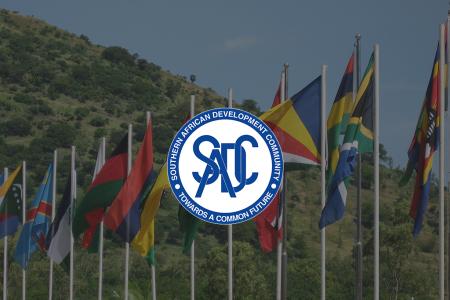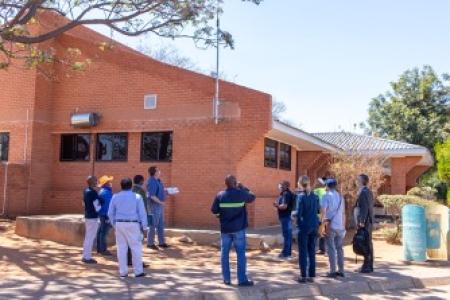CESARE is a cooperation programme between the SADC Secretariat and GIZ, which comprises several components on regional integration areas. The programme aims to improve cooperation between the SADC Secretariat, SADC Member States and the relevant sector bodies, thereby deepening economic integration in the region, exploiting the potential for greater added value at the regional level, supporting the economic empowerment of women and contributing to good governance and peace in the region.
The programme is funded by the German Government through BMZ, furthermore some components are co-financed by the European Union (EU) and the Austrian Development Agency (ADA).
CESARE consists of four measures:
- Trade facilitation to support regional economic integration and industrialisation (TRADE);
- Support towards Industrialisation and the Productive Sectors in the SADC region (SIPS). This measure is co-financed by the EU and supports three regional value chains, namely: Covid 19 relevant medical and pharmaceutical products (CMPP), anti-retroviral pharmaceuticals (ARV), and leather;
- Engagement with SADC Member States in Peace, Security and Good Governance (PSGG) and
- Industrialisation and Women Economic Empowerment (IWEE).
Two additional measures form part of CESARE, but are not undertaken under the umbrella of the SADC Secretariat:
- CESARE Participatory Initiative for Social Accountability in Lesotho (PISA) II measure in Lesotho, co-financed by the EU;
- CESARE SADC-Parliamentary Forum (SADC-PF) measure, co-financed by ADA.
The requirements for regional economic integration in the areas of industrialisation, trade as well as peace and security have improved.
CESARE in its current phase has been ongoing since 2018, and various outcomes have been achieved since then:
As part of TRADE, electronic certificates of origin have been developed. Accompanying documents serve as official confirmation of the origin of an export product. The electronic issuing process saves exporters from having to make journeys sometimes of several hundred kilometres. This standard was accepted by the SADC Negotiating Committee and is currently being implemented in Botswana, Eswatini, Malawi, Namibia, Tanzania and Zambia.
Furthermore, the programme was instrumental in removing a non-tariff barrier (NTB) to trade which had been introduced in the context of the Covid 19 crisis. With the support of the programme, the SADC Business Council and the SADC Secretariat engaged with private and government sectors through workshops, virtual meetings and registering issues on the tradebarriers.org website. In response to the efforts, the free flow of certain pharmaceutical exports without delays caused by the export permit application needs restored trade flows and increased the livelihood and health of citizens in the SADC region.
CESARE and its predecessor project contributed to the successful completion of development and ratification of SADC Protocol on Trade in Services which entered into force in January 2022. The negotiations on the trade in services in the SADC region have been completed for six priority sectors. The programme supported these negotiations. The trade ministers accepted the Member States’ schedule of sector-specific liberalisation commitments covering the six priority sectors namely communication, construction, energy-related finance, tourism and transport services. The guarantees and conditions encourage companies to invest in the SADC markets. The conditions for cross-border trade in services have been reliably defined in these areas. This has reduced the risks to investments. In Zimbabwe, for example, companies from the SADC region face less restrictive conditions than those promised by Zimbabwe in World Trade Organisation negotiations.
In order to swiftly reply to the needs arising during the Covid 19 pandemic, activities to enhance private sector participation in the CMPP value chain have been put in the foreground of SIPS. A total of 14 grant contracts have been concluded with local private and state-owned companies as well as an academic institution for a total value of about 1.43 million euros to allow for design and manufacturing of CMPP products like personal protective equipment (PPE).
In addition to this, an in-depth analysis was conducted on the ARV value chain in the SADC region, in order to gain a better understanding of its potentials, constraints and key players. Also, a detailed mapping and profiling analysis of the leather and associated value chains was undertaken.
Within the PSGG measure, CESARE has been working closely with the SADC Organ on Politics, Defence and Security Cooperation (OPDSC) on topics such as anti-corruption and electoral democracy. For instance, in the pre-election context of the Zambian parliamentary and presidential elections in 2021, a webinar on the SADC Model Law on elections was held. Various other regional dialogue workshops and webinars were held e.g. on the role of parliament in upholding Constitutionalism and the Rule of Law, on the role of parliament in the promotion and protecting human rights; on key international, continental, and regional human rights instruments; and on public financial management. Drawing lessons from the Covid 19 pandemic, a technical round table review of a continental study on enhancing effectiveness of Parliaments in Africa during crises was held in November 2021 with regional and national Parliaments across Africa.
Since June 2019, PISA reached more than 40,000 citizens in the most remote areas of Lesotho with activities creating awareness about their role and responsibility to participate in government decisions. This has been done, among others, through weekly open citizen sessions which offered a platform to discuss and debate governance and developmental issues. The “Let’s keep our books in order” campaign encouraged citizens to stay informed and hold government accountable and the "Express yourself" module trained citizens on how to express issues that affect their communities through art forms such as photography, poetry or short story telling to name a few. Furthermore, the participation of close to 4,000 citizens in inclusive dialogue formats and community responses and citizen representatives was supported. Other activities included the training of more than 200 youth volunteers who deliver peer-to-peer education to more than 10,000 young people in their respective communities and represented youth at the annual Community Parliament organised by Development for Peace Education (DPE) in 2019 and a virtual youth dialogue with representatives of the Lesotho Government, organised by CESARE in 2020. In response to the Covid 19 pandemic, PISA has engaged citizens on the local radio station PCFM asking “How to be a responsible citizen in times of a global pandemic” in order to promote hygiene and social distancing regulations.
Since January 2021, CESARE additionally aims to increase women-owned businesses’ and female entrepreneurs’ participation in value addition for selected regional value chains of the SADC Industrialization Strategy and Roadmap through the IWEE. The measure on industrialisation and women’s economic empowerment seeks to enhance business and product development skills of female entrepreneurs as well as their financial inclusion.


